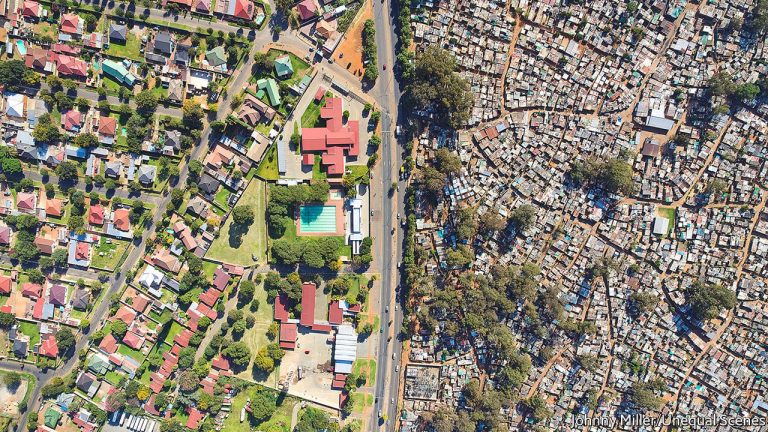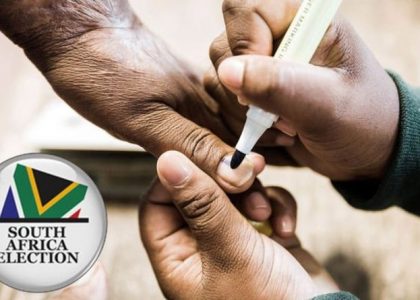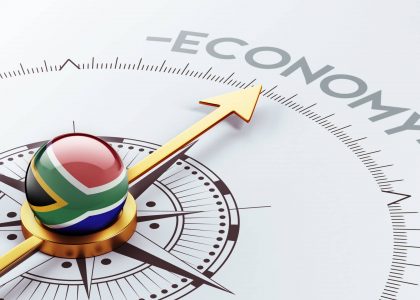South Africa, a country known for its diversity and potential, has been struggling with severe and persistently high levels of inequality. Despite the positive strides the country made in political transformation and economic growth since the end of apartheid, the nation still struggles with stark disparities in wealth. The World Bank states that race significantly influences the structure of South African society, wherein a mere 10% of the population controls more than 80% of the country’s wealth.
Sandton and Alexandra in Johannesburg, as well as Lake Michelle and Masiphumelele in Cape Town, are examples of locations that vividly illustrate the stark contrast of inequality. The country’s inequality remains a pressing challenge that undermines economic growth, social cohesion, and sustainable development. The issue of inequality in the country leads to an imbalanced distribution of power favouring the wealthy, which, in turn, severely restricts social and economic mobility for significant segments of the population. For instance, it can result in a higher cost of living for ordinary South Africans, social unrest, and a rise in crime (to mention a few). Given this context, this article delves into the causes, consequences, and potential solutions to address inequality in South Africa.
Primary Causes of Income Inequality.
Numerous economic factors have played a significant role in the ongoing rise in inequality in South Africa, but undoubtedly, apartheid had a profound influence on the substantial level of disparity in the country. The racial segregation system has left a deep imprint on its society and economy by concentrating wealth and power in the hands of the minority white population while marginalizing and impoverishing the majority black population. Unbiasedly put, apartheid systemically limited the access of people of colour to education, land, and economic opportunities. Despite the formal end of the system in 1994, its repercussions persist and contribute to the widening income disparities in the country.
Similarly, the challenges surrounding land redistribution play a significant role in perpetuating wealth inequality in South Africa. According to a land audit published by the Department of rural development and land reform, 72% of farm and agricultural land remains in the hands of white individuals, with only 4% being held by black individuals. The audit suggests that land ownership patterns originated from apartheid still benefit the minority population, limiting opportunities for land redistribution and economic empowerment for black South Africans. Furthermore, access to productive resources such as land, capital, and technology remains unequal which contributes to income disparities.
Likewise, the International Monetary Fund (IMF) argues that South Africa’s income inequality manifests itself through a skewed income distribution, unequal access to opportunities, and regional disparities. The Bureau of Market Research supports this argument by stating that 75% of the adult population in the country earns below R69 974 per annum (or approximately R5 800 per month), whereas only 3.8% of the adult population earns more than 575 886 per annum (approximately R48 000 per month). The visualization in Figure 1 reveals the skewed income distribution in South Africa in 2021.
Figure 1
Source: Bureau of Market Research
Insufficient investment in education has also been a substantial contributing factor to the rising levels of inequality. According to the World Bank collection of development indicators, South Africa’s government expenditure on education (% of GDP) was 6.6047 % in 2021 which is quite low when compared to other developing countries. South Africa’s education system has been plagued by underfunding and poor quality, with the poorest communities often receiving the least support. This, for instance, has resulted in limited access to quality education and training which limits job opportunities and earning potential thus contributing to inequality.
Lastly, the continuous increase in unemployment has had a significant effect, placing South Africa among the countries with the highest jobless rates worldwide. According to the data published by Statistics South Africa, the country’s unemployment rate reached 32.9% of the labour force in the first quarter of 2023. The labour market in South Africa is particularly burdened with elevated levels of joblessness, especially among the youth. The World Bank’s report reveals that young people bear the greatest brunt of unemployment compared to other age groups. Consequently, perpetuating the cycle of poverty and inequality. Figure 2 depicts that 3.7 million out of 10.2 million young people were not employed in South Africa in Quarter 1 of 2023.
Figure 2
Source: Stats SA
Economic Consequences of Sustained Income Inequality
The repercussions of inequality in South Africa are extensive and profoundly affect the entire society. These consequences encompass, but are not limited to, poverty, unemployment, reduced social cohesion, heightened crime and insecurity, and health disparities. Allow me to elaborate. Firstly, inequality is correlated with poverty and high unemployment rates. A considerable segment of the population, particularly the youth, faces challenges in accessing significant employment and income-generating avenues, which consequently perpetuates entrenched poverty and fosters social instability.
Secondly, inequality undermines social cohesion, fostering resentment and creating divisions among various racial and socio-economic groups. Consequently, nation-building efforts suffer, and existing tensions may worsen. Thirdly, Inequality can lead to increased crime rates and heightened feelings of insecurity among the populace. As the saying goes, desperate circumstances can drive individuals towards criminal activities, further exacerbating social problems. Fourthly, income inequality is directly linked to disparities in access to healthcare services. For instance, individuals with lower incomes encounter obstacles in accessing quality healthcare, leading to poorer health outcomes for marginalized communities.
Potential Solutions to Address Inequality in South Africa
Numerous policies, including progressive fiscal redistribution, Black Economic Empowerment (BEE), employment equity, and affirmative action to diversify wealth ownership, among others, have been proposed in an attempt to address inequality in South Africa. Regrettably, most of these policies have proven ineffective. Why? The main reasons behind their shortcomings are associated with inadequate policy implementation and corruption within the public sector. Let’s explore several potential solutions that we believe could alleviate the inequality in South Africa.
Equitable Education Reforms: Investing in education and significantly improving the quality of education in historically disadvantaged communities is important to breaking the cycle of poverty. Allow me to emphasize that granting equal access to quality education can empower the population with the necessary skills to actively participate in the South African economy. Nations that prioritize investments in quality education typically experience minimal or no inequality. As a result, it becomes crucial for the South African government to prioritize education in its budget to enhance the quality of education to reduce inequality.
Introduction of Wealth Tax: Despite facing significant criticism, particularly from affluent individuals, research and economic theory strongly supports the idea that implementing a more progressive wealth tax system can play a vital role in redistributing wealth. In essence, this approach involves imposing higher tax rates on the wealthy and corporations while providing relief for low-income earners.
According to the Southern Centre for Inequality Studies, implementing a wealth tax on the wealthiest 354,000 individuals in South Africa could generate a minimum of R143 billion, equivalent to 29% of the total R500 billion fiscal cost of the relief package. The resulting additional revenue can be directed towards funding social welfare programs that aim to uplift the disadvantaged segments of society. With this in mind, the South African tax system can play a pivotal role in decreasing inequality.
Creating Employment and Economic Empowerment: The South African government possesses the potential to significantly reduce the unemployment rate in the country. Allow me to elaborate. One effective approach would be to employ a substantial percentage, possibly 40% or even 50%, of the unemployed population and ensure that they are compensated above the minimum wage. Additionally, the government could bolster this policy by offering social benefits to these employees, including free healthcare, housing, and tax exemptions.
Moreover, a collaborative effort between the government and the private sector is essential to create an environment conducive to job creation. This can be achieved by supporting and promoting small and medium enterprises (SMEs), improving access to credit and capital, and fostering entrepreneurship. Such initiatives can stimulate economic growth and generate employment opportunities, particularly for disadvantaged populations, ultimately leading to a reduction in inequality.
Land and Property Ownership Redistribution: It is no secret that this policy is often used by politicians as a political tool to garner votes. However, it is proven that land redistribution allows for more equitable ownership of productive assets. By providing land to historically disadvantaged communities, it helps narrow the wealth gap and promotes economic opportunities for previously marginalized groups. While this policy has the potential to decrease inequality in South Africa, it should be approached cautiously and with thoughtful deliberation. Implementing comprehensive land reform policies that ensure equitable distribution and promote agricultural development can address the imbalances of the past. This policy should be accompanied by support for sustainable farming practices, access to credit, and technical support to enhance productivity and income generation.
Decrease Corruption: The attainment of the above potential solutions becomes exceedingly challenging in the face of persistent corruption. To effectively reduce inequality in South Africa, the government must become impervious to corruption and ensure the proper implementation of these policies for the benefit of the intended beneficiaries. When corruption is reduced in South Africa, public resources are allocated more efficiently and fairly. For instance, funds intended for poverty alleviation, education, healthcare, and social programs can reach the intended beneficiaries, especially those from disadvantaged backgrounds, rather than being siphoned off by corrupt officials or entities.
To conclude, the unequal distribution of wealth remains a significant hurdle in South Africa, stemming from historical and structural factors. To foster a fairer and more inclusive society, it is crucial to tackle the underlying causes of wealth disparities through various means, including investment in education, land reform, job creation, progressive taxation and reduce corruption. By promoting economic opportunities and ensuring equitable access to resources, South Africa can work towards building a more egalitarian society, where all individuals have the opportunity to thrive and contribute to the nation’s development.





